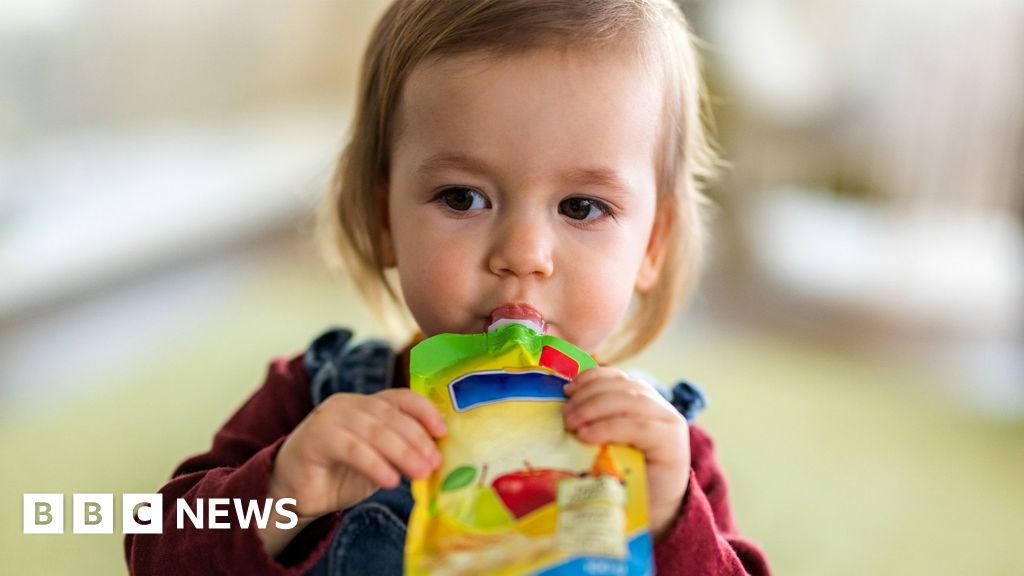BBC News
Parents should not rely on shop-bought baby food pouches as everyday meals, new government guidance states.
It is the first time the NHS website has published advice on commercial baby food, and follows an investigation by BBC Panorama which found baby food pouches from six leading UK brands failed to meet their key nutritional needs.
Campaigners, critical of the way companies market their products as healthy options, have welcomed the changes.
Some leading baby food pouches carry labels such as “perfectly balanced for growing babies” or “packed with goodness”.
‘It’s about time’ advice introduced
The NHS Start For Life website, run by the Department of Health and Social Care, also now advises parents to check food labels and choose products with the least amount of sugar, and to not let babies or children suck directly from food pouches – which can increase their risk of tooth decay.
And it also says they should not feed snacks to children under one. Baby food snacks – such as puffs and sticks – have grown in popularity in recent years.
Baby weaning expert and author Charlotte Stirling-Reed told the BBC it was “about time that this was addressed… because food pouches and commercial baby foods are used so much by parents. It was a real gap in the NHS advice until now.”
Dr Vicky Sibson, director of the charity First Steps Nutrition Trust which campaigns for improvements in shop-bought baby foods, told the BBC that without clear advice it can be “confusing for parents” when they see shop-bought products marketed as being “just as good” as homemade foods.
In April, BBC Panorama looked at the baby food pouches of six leading companies. The products have become a staple for many households with babies and children up to the age of two or three. They are convenient and have long shelf lives.
But experts believe the products should only be used sparingly, are not replacements for homemade meals, and can cause children health problems if used as their main source of nutrition.
When this was put to some of the leading brands, the market leader Ella’s Kitchen told the BBC it agreed with all three points.
The other brands featured in the investigation – Heinz, Piccolo, Little Freddie, Aldi and Lidl – said their products were intended as a complementary part of a child’s varied weaning diet.
The NHS Start For Life website also now states that parents should wait until their baby is around six months old before feeding them solid foods, even if labels say the products are suitable from four months.
Currently, among the brands investigated by Panorama, the companies Piccolo, Ella’s Kitchen and Aldi promote their fruit-based pouches to babies as young as four months, despite the NHS and World Health Organization saying babies should not be given solid food until about the age of six months.
Since Panorama began its investigation, all three companies said they are rebranding their products as suitable from six months.
Baby food regulations ‘need updating’
Dr Sibson believes the government should now look to introduce stronger mandatory regulations for companies producing commercial baby foods to improve the suitability of the products for young children and regulate how they are marketed to parents.
The Department of Health and Social Care told the BBC “current laws already set strong standards for baby food and we support action against any products that don’t meet them”.
The British Retail Consortium says companies “take great care to optimise the nutritional composition of these products. All products are clearly labelled so parents can make informed decisions when feeding their baby.”
Source link : https://www.bbc.com/news/articles/c628vpgd7zpo
Author :
Publish date : 2025-06-09 15:59:00
Copyright for syndicated content belongs to the linked Source.
